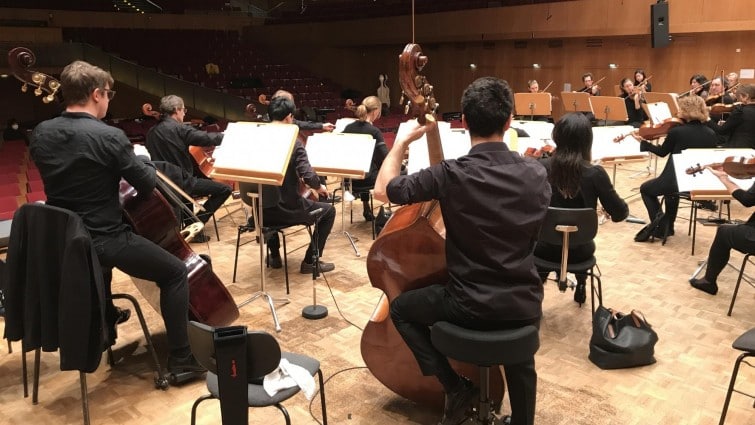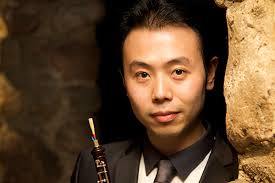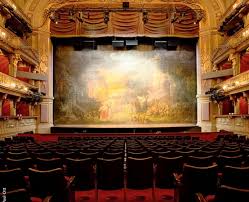Covid is killing the role of conductor
mainThe Deutsches Symphonie-Orchester Berlin, like most large ensembles, has been forced by Covid rules to play with fewer musicians on stage, in an empty hall, effectively as a chamber orchestra.
Its latest programme reads:
Leoš Janáček
idyll. Suite for string orchestra
Ralph Vaughan Williams
Five Variants of “Dives and Lazarus” for harp and string orchestra
Josef Suk
Serenade for Strings in E flat major, op.6
As they were rehearsing, the players realised this was the first time in its history that the orchestra was appearing without a conductor.
It won’t be the last – for them, or for others.
The first victim of Covid is the orchestral conductor.
Discuss.






The less Ticciati, the better.
Whatever ….
If you criticize you should be prepared to reveal your identity.
Your comment would carry more weight if you had revealed your own identity.
The Ticciati fans are renowned for their anonymity.
hahaha
Chamber and string orchestra repertoire is easy for them. Look at the Australian Chamber Orchestra and others. They’ve been doing it led by the violin for years. Not sure works for large forces would benefit from a lack of a conductor, though.
That is precisely the conundrum. Yes, chamber performances, even chamber versions of the larger pieces, will work quite well for a GOOD ensemble working without a conductor but as for the music which requires much larger forces to be effective and played as the composer envisaged……….? We shall see whether they get programmed after the pandemic strictures are relaxed.
I was thinking about the same thing today. During these times those orchestras are the luckiest where the chief conductor is also an active instrumentalist and can sit down with the orchestra players for some chamber music.
Realistically, small ensembles and chamber orchestras are still able to perform, whereas large orchestras with conductor have difficulties with social distancing.
In time, they too will return to normal.
Which is was how it was done before there ever was a ‘conductor.’
And so performance sucked, but no one knew any better.
Good God people, where are the jokes?
One of the greatest concerts I ever heard was with the conductorless Prague Chamber Orchestra. In recent years, the Los Angeles based Kaleidoscope orchestra plays without a conductor – and it’s not chamber music. They did a thrilling Shostakovich 5th without an over-paid baton wielder. The players are young, talented and play standing (well, most of them). No question: we’ve paid too much attention to conductors for too long and need to get back to the performers and composers.
That’s really pushing the boat out to do Shostakovich 5 without a conductor. I wonder how much rehearsal time they had? Because you can bet your life that you can’t pull off a piece like that on two rehearsals without someone directing proceedings.
I agree in general that conductors are over-idolised; and usually, the wrong ones. Those who do their damnedest to ensure the composer’s work is faithfully performed are usually described as ‘pedestrian’, ‘plodding’ etc – Haitink was viewed that way for years, albeit not latterly.
I wish more agents knew enough about music to respect the ones that are *good* rather than merely flashy…
But there’s the little matter of interpretation.
On the other hand…. I recently was asked to lead the Stravinsky Octet. The eight musicians found that they could not do it on their own with distancing in place, as it was too difficult to coordinate. It was my first time conducting in seven months.
dear maestro! i stay anon on here but wow can i remember your conducting classes in aspen. i would be in the orch and watch you teach. i learned a lot and you were brilliant at it. but i have to say, i have programed said stravinsky and (this was before distancing) but the players handled it superbly all on their own… looking forward to meeting up again sometime, in detroit or otherwhere…. you are simply great…
Covid is most likely taking its toll on music criticism, the role with least use to a healthy music industry.
Just because DSO Berlin is appearing for the first time without a conductor does not mean that the role of conductors is “over” in a post-COVID world. Different, sure, but not gone forever. Certainly not because one of Germany’s orchestras is playing a chamber orchestra sized concert without one. But as always, NL plays up the toxicity for engagement. Keep up the good work!
Mr Lebrecht assertion is extremely pertinent, and he leaves it clearly to discussion within the blog writers. It is up to us conductors to be insightful and convincing on the repertoire is left -because of the social distancing, we are restricted to chamber repertoire . Obvious challenges are transparent: musicians should connect at listening, which now is eloquently harder than before 2020: place your musicians at the advised distance and you will see that they suffer when trying to hear eache other. In our case, Suk’s Serenade or Stravinsky’s Dumbarton Oaks, or Bartok’s Divertimento had not been played before, so the conductor needed to introduce style, traditions, phrasings, bowings, balance, even explain the harmonic structure, etc. My Orpheus Chamber Orchestra friends would have led the pieces easily without a driver, but that is a truly exceptional case, like other wonderful chamber ensembles in the world.
Every orchestra has some kind of leader – first violin, principal oboe , harpsichordist. You can’t turn players loose on their own.
“Musicians should connect at listening”–
—-finally, a statement that should not be taken lightly IMHO.
When starting their careers in a symphony orchestra, many musicians rely more on the visual aspect of following a conductor, rather than the audible art of playing together.
Why do they neglect the fact that their ears can help them out more than their eyes can?
I remember Andris Nelsons conducting Richard Strauss’s opening sextet from Capriccio. If he can do it why can’t other conductors?
I listen to an orchestral performance for the conductor, as do most people I’d have thought. You go to a concert conducted by (insert name here) as people go to hear Jonas Kaufmann or Anna Netrebko, et al.
Sorry but this whole story is a false concoction in as much as anyone who listens to the DSO streams knows that they have put on quite a few reduced ensemble performances, with interesting repertoire and requiring a conductor. One swallow and all that.
As we say in the old country: “from your lips and into God’s ears!”
May it certainly do exactly that!